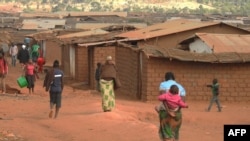Malawi’s government has told refugees and asylum-seekers to relocate to the country’s lone refugee camp by April 15 or face forced eviction from their homes.
The Ministry of Homeland Security said in a statement Thursday that the new deadline followed the expiration of the February 1 deadline the government set last year for about 8,000 refugees who had settled outside the Dzaleka refugee camp.
Ken Zikhale Ngoma, Malawi's minister of homeland security, said the latest move was in line with Malawi’s encampment policy, which prohibits refugees from staying outside a refugee camp.
Ngoma said the Dzaleka camp in central Malawi has facilities that meet international standards for all refugees and asylum-seekers, including primary and secondary schools, a health center and a public market.
Raphael Ndabagha, a refugee from the Democratic Republic of the Congo, disputes that.
Ndabagha lived outside the Dzaleka camp before returning ahead of the February 1 deadline. "The advantage of living in the city, you have many more opportunities than the camp," he said. "In the city, if you are a businessperson, you can open a shop and you are able to make a living, because you can make income, you can prosper.”
Ndabagha said that in the city, his three children were able to go to better schools than those in and around the refugee camp.
Kenyi Emanuel Lukajo, associate external relations and reporting officer for the U.N. refugee agency UNHCR in Malawi, told VOA on Friday that the agency would comment officially on the new deadline later.
However, the UNHCR had previously expressed concerns when the Malawi government issued the first relocation order in August 2022.
The refugee agency said in a statement that the relocation would result in extreme pressure on the camp’s already inadequate health services, water, shelter and sanitation.
But the Malawi government said in its new order that refugees were already given ample time to make necessary arrangements for the relocation.
It warned that those resisting the new deadline would be forcefully evicted from their homes.
Business operators in Malawi have long threatened to forcefully evict refugees from market areas, saying they are bringing unnecessary competition in terms of prices of goods.
Teneson Mulimbula, general secretary for an association of small-business operators in Malawi, said, “If you go to their shops you will find that there is stock, farm produce items like beans, rice, peas, which they receive at Dzaleka refugee camp. And just because they receive them freely, they start selling them at a lower price.”
But some refugee traders, who asked not to be named for fear of reprisals, denied that they were selling items from the refugee camp.
The government said state agencies such as the Malawi Police Service and the Department of Immigration and Citizenship Services would be involved in the relocation.
It added that any person or group found to be harassing refugees or asylum-seekers would be arrested.
Dzaleka is home to refugees and asylum-seekers from Burundi, the Democratic Republic of the Congo, Ethiopia, Rwanda and Somalia.
The camp was meant to accommodate about 10,000 refugees but now is home to more than 50,000.
